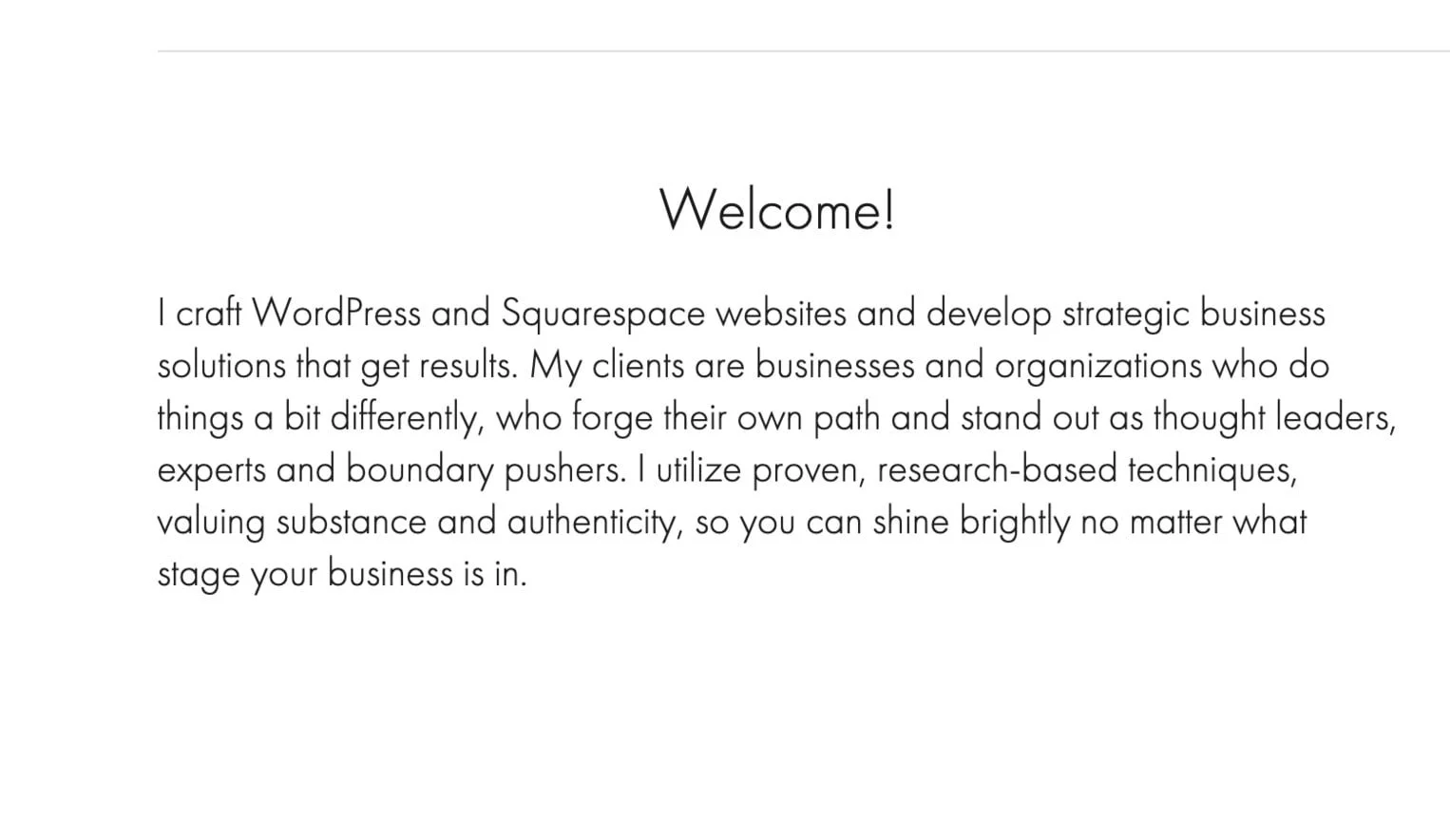What to do if your Website has been Plagiarized
If you do business online long enough and receivepositive attention, you’ll eventually find yourself in the miserable and uncomfortable situation of being plagiarized. I know, it’s hard to believe, but you will. While this has happened to me several times, the absolute worst case of it happened recently. And, since my site is on Squarespace, it had particular challenges due to the lack of backups and site archives.
The Situation: Rampant Plagiarism of the SM&Co Website
Recently, someone let me know that another Squarespace designer was using Design in a Day™ as a service name, with the text somewhat similar to mine. Sure, I was bummed and I planned on reaching out to that designer (who has since changed their text and name), but it wasn't as egregious as EIGHT (yes, you read that right) websites I found (thanks Copyscape) that had lifted entire pages or sections off my website. On company had republished all of our Design in a Day™ and Custom Website pages. Another had copied our entire homepage text. One of the thieves recently spoke at an ethics society as part of an AIGA event. (You can’t make this up.)
Check out some of the examples (this is from four of the worst infringers). It goes on and on and on…
The plot thickens, however! I posted in my Facebook group about this situation and several other designers discovered multiple instances of their content being lifted verbatim and presented on other company’s websites. The phenomenon was everywhere! Kerstin Martin discussed this on her site recently.
Why plagiarism and copyright infringement matters.
I understand that a lot of folks would probably take the high road and simply ignore this sort of thing, and there’s a part of me that really respects that. However, I am obligated to protect my business, which is my family’s sole livelihood (my husband works for SMCo) and also contributes meaningfully to other people’s livelihoods as well.
Plagiarism is not only deeply unethical, it creates serious search engine optimization problems (I’ve seen a substantial dip in recent months, largely due to Squarespace deleting their Specialists directory in favor of a reverse affiliate program in which they get a cut of designer’s income, but now I wonder how duplicate content impacted this as well).
It also erodes the brand of the person who’s stolen from. I’ve spent over a decade refining the “voice” for my company, which literally has my name on it, and someone else using it for their company can seriously harm that work. What if someone had seen the website that stole our Design in a Day™ page verbatim first and then stumbled upon our site? They’d likely assume we were the copycat. This would harm everything we’ve worked toward over the years, all because someone wanted to take a shortcut instead of honing their own voice and vision.
I like to think that some of the folks simply were naive and were hoping for shortcuts to success, particularly since writing website copy is so difficult.
I posted the following message to Squarespace’s Circle community of people who are users on three or more websites:
Hi all! A couple years ago I was thrilled to lend a hand to our community by hosting an Ask Me Anything about creative collaboration, specifically our Website Design in a Day™ program. I love how many of you have productized your services, teamed up with others, and systemized your businesses partially due to that AMA. It makes my heart happy!
However, the ugly side of it has been that at least two Circle members that I know of have copied, verbatim, our content and, in one case, even our name for that productized service. My hope is that the folks who’ve done this simply don’t understand copyright and trademarks, and were just naive. However, this is extremely harmful, both personally, and from an SEO perspective (duplicate content is a killer). It’s painful to see this as the response to an attempt to give back. Folks who know me know that I support other designers generously and go out on a limb to stick up for the design community even when it’s awkward because I believe that we’re all better together.
If you’re inspired by others, that’s great, but remember that originality, including in our words, is absolutely essential to our credibility. If copying seems easier, it’s not–you’ll never operate from a place of authenticity and your success will never be something you can be proud of, since it’s not yours.
If you’ve been helpful to others in this community, please also take care of your businesses and take steps to issue DMCA takedown notices when it’s appropriate. You have legal recourse too, if web hosts aren’t helpful. (I’ve been through this before, so I knew what steps to take, but I realize a lot of people don’t know they have recourse in this situation.)
Fortunately, a couple of folks who were using the DIAD name to promote their Squarespace design services immediately modified their copy, realizing their mistakes. The rest, I had to spend the bulk of this past week dealing with. Now, I’m not an attorney, but I have some history dealing with this (I actually once had a photo lifted and reused by a major media outlet without permission or credit, so that experience showed me that it’s critical to move quickly and follow the appropriate steps to protect yourself).
Here’s what I recommend doing to protect yourself against plagiarism.
Run your site through Copyscape. This site checks for duplicated content and allows you to compare. You will likely see some similarities in content if you work in a narrow industry, so don’t assume everyone is plagiarizing—you can tell when it’s copied and when it’s not.
Screenshot everything. Every single instance needs to be captured, with URLs recorded. I recommend digging into Archive.org’s wayback machine to determine publishing dates as well.
File a DMCA takedown notice with each webhost. This was actually pretty simple on GoDaddy and some others—they had forms to fill out. Squarespace was weirdly challenging, as they don’t have a form, nor do their take email submitted tickets, so I had to submit my notice, then it got routed through their ticketing system and then back to me where I had to resubmit all my documentation. Strange and unnecessarily difficult. Oddly, one plagiarized section was not removed, and the problem is that that particular section on my website had changed and there’s no backup/snapshot of this page.
Consider sending a cease and desist letter if you don’t get resolution. This should probably involve a business attorney, but there are online services that allow you to DIY this type of notice. Again, documentation is critical.
Decide how far you want to pursue this and what you’re obligated to do if you’re a trademark holder—you often need to defend every infringement if you have a trademark, which can get costly and stressful.
Notice that I don’t recommend reaching out to the thief directly. While I can see the advantage of resolving it without involving webhosts and legalities, the worry is that the person, if they’re nefarious, could use that warning to file a takedown notice against you first, even though your site is the originator of the content. This can and does happen. I would never take that risk on my business. Yes, most people will simply be embarrassed and take down the content, but you just don’t know.
If you’re plagiarized and the infringing site is on Squarespace or your site is on Squarespace, here’s what you need to know.
Instructions for notifying Squarespace if they are hosting infringing content can be found here: https://www.squarespace.com/copyright-policy
If your site site popular, consider screenshotting your site each time you make significant modifications. I actually was able to dig some screenshots off my computer and use those as part of my claim. I’d done some updates this spring, so some of my stolen copy wasn’t on my site anymore but screenshots saved the day. Squarespace does not have a user-accessible backup system so this is important.
Dig through archive.org and look for records of your site and the infringer’s website. Note the dates for your records and submit that with your notice.
Ultimately, remember that this isn’t personal, that people are constantly looking for shortcuts for success. You are not a bad person for protecting your work and your livelihood, and don’t let anyone make you feel guilty about taking steps to remove stolen work from the internet.

















Are lead magnets for consultants dead? Not so fast! We dive into what’s working, what’s not, and the one key ingredient to a successful consultant lead magnet in 2026.